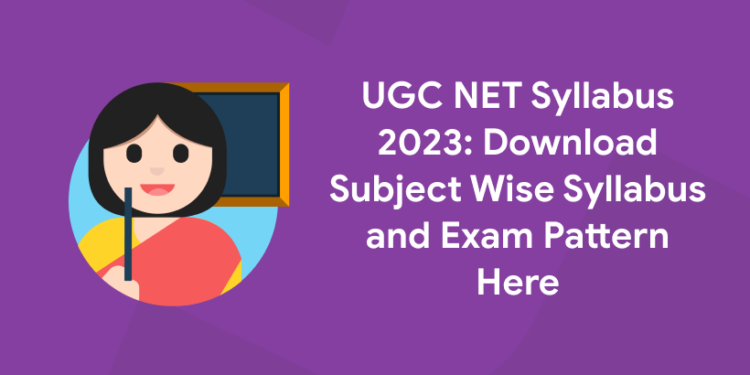Table of Contents
UGC NET Syllabus has been issued subject-wise by National Testing Agency (NTA) on their official website. UGC NET December 2022 Exam is going to be held from 21st February 2023 to 10 March 2023 at various centers through CBT mode.
All the appearing candidates are preparing for exams, they should start studying the UGC NET syllabus and exam pattern for 2023 Paper-I & Paper-II. In this article, the candidates will find all the relevant information regarding the revised UGC NET Syllabus & Exam Pattern.
| Name of the Exam | National Eligibility Test (NET) |
| Conducting Body | National Testing Agency (NTA) |
| Purpose | Assistant Professor Junior Research Fellowship and Assistant Professor |
| Frequency of the Exam | Twice a Year |
| Mode of Examination | Online |
| Type of Questions | Multiple Choice Questions (MCQs) |
| Number of Papers | Paper-I (General) and Paper-II (Subject) |
| Duration | 3 hours |
| Number of Questions | 150 |
| Negative Marking | No |
| Official Website | https://www.ugcnetonline.in/ |
UGC NET Syllabus: Paper 1 and Paper 2
UGC NET Syllabus 2023: Paper 1
UGC NET Paper 1 syllabus 2023 comprises topics from General Paper on Teaching and Research Aptitude, which is common and mandatory for all candidates. Check the complete UGC NET syllabus for Paper 1 below.
Unit-I: Teaching Aptitude
- Teaching: Concept, objectives, levels of teaching (memory, understanding and reflective), characteristics and basic requirements
- Learner’s characteristics: Characteristics of adolescent and adult learners (academic, social, emotional and cognitive), individual differences
- Factors affecting teaching related to: Teacher, Learner, Support material, Instructional facilities, Learning environment and Institution
- Methods of teaching in higher learning institutions: Teacher-centred vs learner-centred methods; offline vs online methods (Swayam, Swayamprabha, MOOCs, etc.).
- Teaching support system: Traditional, modern and ICT based
- Evaluation systems: Elements and types of evaluation, evaluation in Choice Based Credit Systems in higher education, computer-based testing, innovations in evaluation systems
Unit-II: Research Aptitude
- Research: Meaning, types, and characteristics, positivism and post-positivistic approach to research
- Methods of research: Experimental, descriptive, historical, qualitative and quantitative methods
- Steps of research
- Thesis and article writing: Format and styles of referencing
- Application of ICT in research
- Research ethics
Unit-III: Comprehension
- A passage of text is given. Questions are asked from the passage which need to be answered.
Unit-IV: Communication
- Communication: Meaning, types and characteristics of communication
- Effective communication: Verbal and non-verbal, inter-cultural and group communications, classroom communication
- Barriers to effective communication
- Mass-media and society
Unit-V: Mathematical Reasoning and Aptitude
- Types of reasoning
- Number series, letter series, codes and relationships
- Mathematical aptitude (fraction, time & distance, ratio, proportion and percentage, profit and loss, interest and discounting, averages etc.)
Unit-VI: Logical Reasoning
- Understanding the structure of arguments: Argument forms, structure of categorical propositions, mood and figure, formal and informal fallacies, uses of language, connotations and denotations of terms, the classical square of opposition
- Evaluating and distinguishing deductive and inductive reasoning
- Analogies
- Venn diagram: Simple and multiple use for establishing validity of arguments
- Indian Logic: Means of knowledge
- Pramanas: Pratyaksha (Perception), Anumana (Inference), Upamana (Comparison), Shabda (Verbal testimony), Arthapatti (Implication) and Anupalabddhi (Non-apprehension)
- Structure and kinds of Anumana (inference), Vyapti (invariable relation), Hetvabhasas (fallacies of inference)
Unit-VII: Data Interpretation
- Sources, acquisition and classification of data
- Quantitative and qualitative data
- Graphical representation (bar-chart, histograms, pie-chart, table-chart and line-chart) and mapping of data
- Data interpretation
- Data and governance
Unit-VIII: Information and Communication Technology (ICT)
- ICT: General abbreviations and terminology
- Basics of Internet, Intranet, E-mail, Audio and Video-conferencing
- Digital initiatives in higher education
- ICT and Governance
Unit-IX: People, Development and Environment
- Development and environment: Millennium development and Sustainable development goals
- Human and environment interaction: Anthropogenic activities and their impacts on the environment
- Environmental issues: Local, regional and global; air pollution, water pollution, soil pollution, noise pollution, waste (solid, liquid, biomedical, hazardous, electronic), climate change and its socio-economic and political dimensions
- Impacts of pollutants on human health
- Natural and energy resources: Solar, Wind, Soil, Hydro, Geothermal, Biomass, Nuclear and Forests
- Natural hazards and disasters: Mitigation strategies
- Environmental Protection Act (1986), National Action Plan on Climate Change, International agreements/efforts -Montreal Protocol, Rio Summit, Convention on Biodiversity, Kyoto Protocol, Paris Agreement, International Solar Alliance
Unit-X: Higher Education System
- Institutions of higher learning and education in ancient India
- Evolution of higher learning and research in post-independence India
- Oriental, conventional and non-conventional learning programmes in India
- Professional, technical and skill-based education.
- Value education and environmental education
- Policies, governance, and administration
UGC NET Paper 1 Syllabus PDF
UGC NET Paper 2 Syllabus
UGC NET paper 2 exam is subject-specific and based on the subjects chosen by the candidate. Paper 2 comprises 100 questions that hold two marks for each correct answer. The maximum mark in Paper 2 is two hundred. The candidates have to start preparing for the paper 2 exams from their university days as paper 2 is for specialization. The candidates have to choose the subject that they have studied in their post-graduation for paper 2. The PDF for UGC NET Paper 2 syllabus has been given below for the candidates.
Download Subject Wise UGC NET Paper 2 Syllabus PDF
The subject for UGC NET Paper 2 needs to be chosen by the candidate. A candidate can choose the subject of his/her post-graduation or a related subject. NTA UGC NET is conducted for a total of 83 subjects.
UGC NET Syllabus: Documents Required
Keep the following documents or information ready beforehand before registering for UGC NET Exam:
- University/Board Certificate
- Aadhar Card Number/Passport/Voter ID Card/Ration Card
- Degree Certificate
- Category Certificate (if applicable)
- PwD certificate (Person with Disability)
- EWS certificate (Economically Weaker Section) (if applicable)
- A valid email ID and mobile number
- Scanned images of photos and signatures in JPG format. (Photo size: 10kb – 200kb) (Signature size: 4kb – 30kb)
- Address (Permanent and Correspondence)
- Code of NET subject
- Code of Post-Graduation course
- Four exam cities in order to preference
UGC NET JRF Fellowship Amount
| Details | Fellowship Amount |
| JRF Fellowship Amount | For the first 2 years, Rs 31,000 will be awarded yearly. For the remaining portion, Rs 35,000 will be given. |
| Contingency Amount [Humanities and Social Sciences] | Initial 2 years – Rs 10,000 Thereafter, Rs 25,000 will be awarded. |
| Contingency Amount [Science] | Initial 2 years – Rs 12,500 Thereafter, Rs 25,000. |
| HRA | The amount can vary from one university to another |
FAQs
How many papers are in UGC NET?
There are two basic papers in UGC NET, i.e. Paper 1 and Paper 2, and the total duration of the examination is 3 hours. Paper 1 consists of 50 MCQ’s while Paper 2 consists of 100 MCQ’s.
Is the UGC NET syllabus changed?
There have been no concrete changes notified till now for UGC NET Syllabus 2021.
Paper 1 mainly includes teaching and reasoning ability, research aptitude, comprehension, divergent thinking, as well as general awareness of the candidate.
What is the pass mark for the UGC NET exam?
The passing marks for UGC NET are 40% in General and 35% for reserved.













